EVENTS IN SOUTH KOREA: AN END TO A BIZARRE SAGA
Using the history of South Korea to explain President Yoon's bizarre behaviour on South Korean national television
In the alternative media space, there are rumblings that there is a hidden US government hand in the bizarre and lame attempt by President of Yoon Suk Yeol of the Republic of Korea (ROK) to carry out a civilian coup ‘d'état through the instrumentalization of Martial Law.
I am generally suspicious of attempts to assign overarching geopolitical motives to political events that can easily be explained as the machinations of domestic national squabbles. Contrary to what some may think, there are actual coup d'états in the world that don't have an external hand driving it. The entire political establishment in South Korea (ROK) is pro-American, regardless of ideological bent.

President Syngman Rhee was pro-American despite his forced resignation in 1960. He was succeeded by the weak civilian government of President Yun Po-sun that was also pro-American. Yun Po-sun’s government was overthrown by pro-American ROK Army General Park Chung Hee on 16 May 1961.
Park Chung Hee was assassinated on 26 October 1979 by his own Director of Intelligence who was staunchly pro-American. The late military ruler was succeeded by the pro-American civilian government of Choi Kyu-hah, which was rendered powerless by the December 1979 coup and then destroyed outright by the May 1980 coup. Both coups were carried out by pro-American ROK Army General Chun Doo-hwan. In other words, the constant rising and falling of political leaders in South Korea has nothing to do with geopolitical machinations, but internal struggles between different political factions that are loyal to the Americans.
Every single political leader has been broadly supportive of the strategic alliance between South Korea and the United States. Even petty squabbles between those ROK political leaders and certain US administrations have never affected that strategic alliance. For instance, there were constant tensions between military junta of Park Chung Hee and the Carter Administration over the junta’s ruthless behaviour towards political dissidents and the mass murder of hundreds of protesters across the country.
Those tensions reached their peak in 1979 over attempts by the junta to imprison the political dissident Kim Young-sam , who had been expelled from the rubber-stamp legislative body created by Park Chung Hee. US President Jimmy Carter expressed his anger by recalling the US Ambassador in Seoul.

To understand what led to President Yoon Suk Yeol’s seemingly bizzare attempt to carry out a civilian coup by declaring Martial Law, one must first understand the history and domestic political currents within South Korea.
South Korean domestic politics is characterized two clashing traditions: (1) the hardline anti-North Korean conservative tradition and (2) the dovish pro-unification tradition.
It is important to note that “pro-unification” here simply means South Korea peacefully annexes the territory of a defunct North Korean state in the style of West Germany acquiring the territory of the defunct East German republic after many years of friendly relations between the two German states.
South Korean politicians who follow the dovish pro-unification tradition believe that friendly relations with the communist leadership on the other side of the Demilitarized Zone (DMZ) will lead to an opening of the insular society of North Korea (DPRK). The hope is that the exposure of ordinary North Koreans to the wealth and lifestyle of South Korea will cause widespread disillusionment with their communist government. The much poorer North Koreans would then revolt and topple their government. That would be followed by South Korea swooping in to “peacefully” absorb the territory of the collapsed North Korean state.
To kick off the above described chain of events, dovish pro-unification politicians in South Korea believe that serious concessions and unconditional financial aid need to be extended to communist leadership of the DPRK to gain its friendship and trust.
On the opposite end of the spectrum is the deeply conservative (and historically militarist) anti-North Korean political tradition, which is wary of any concessions to the DPRK. This political tradition also tends to advocate for a reinforcement of the pre-existing military alliance with USA.
National leaders such as Syngman Rhee (1948-1960), Park Chung Hee (1961-1979), Chun Doo-hwan (1980-1988), Lee Myung-bak (2008-2013), Park Geun-hye (2013-2017) and Yoon Suk Yeol (2022-present) represent this hardline political tradition. Most senior officers of the ROK Army subscribe to this political tradition. Yoon’s ruling People Power Party is also on that end of the political spectrum.
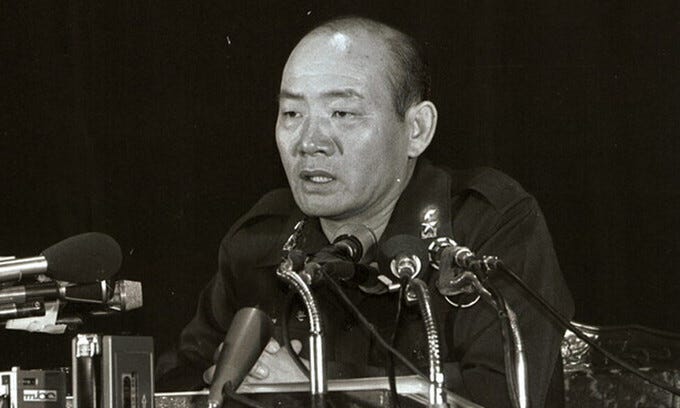
The rival pro-unification tradition has been represented by figures such as Cho Bong-am, Kim Young-sam, Kim Dae-jung, Roh Moo-hyun, and the present-day opposition Democratic Party, which has a majority in the current Parliament.
Historically, the pro-unification political tradition suffered several decades of repression despite the fact its proponents have also been loyal to the USA.
One of the earliest victims of this repression is Cho Bong-am who started his political career in Japanese-ruled Korea (1910-1945) as a pro-independence Marxist. After Japanese rule in Korea was overthrown at the end of the Second World War, Cho grew disillusioned with the excesses of Stalinism and the utter subservience of South Korean Marxists to the USSR.
He eventually denounced communism in 1946 and slowly drifted towards liberalism, developing his own unique blend of rightwing populism, anti-communism, liberalism and social welfarism. He was also one of the earliest advocates of peaceful reunification in an era dominated by extreme rightwing politicians who hysterically advocated the military conquest of North Korea.
While remaining implacably hostile to the DPRK, this hardline political tendency within the ROK somewhat lost its militarist sheen as a result of the sobering stalemate imposed on South Korea by the invading North Korean forces during the Korean War (1950-1953).
During that war, USA and UK assembled a miliary coalition made up of their own troops and forces from 14 other countries to fight on the South Korean side. On the opposite side, China sent military volunteers (including Mao Zedong’s eldest son) to fight alongside the North Koreans.
The Soviet Union provided military assistance to the North Koreans and their Chinese volunteers. Additionally, Soviet pilots covertly flew attack aircraft that strafed and bombed South Korean and American battle lines
Nevertheless, the Chinese leader Mao Zedong felt betrayed that the Soviets had refused to openly join the Korean war effort by sending armoured and infantry army units into battle alongside the North Koreans and their allied Chinese volunteer force. The Chinese volunteers did most of the actual fighting on the ground against South Korea and its sixteen military allies.
According to Chinese historian Zhang Xiaoming, Chairman Mao Zedong’s disappointment with Soviet behaviour during the Korean War was the first stirrings of what eventually morphed into a full blown Sino-Soviet Split (1961-1989) a couple of years later.
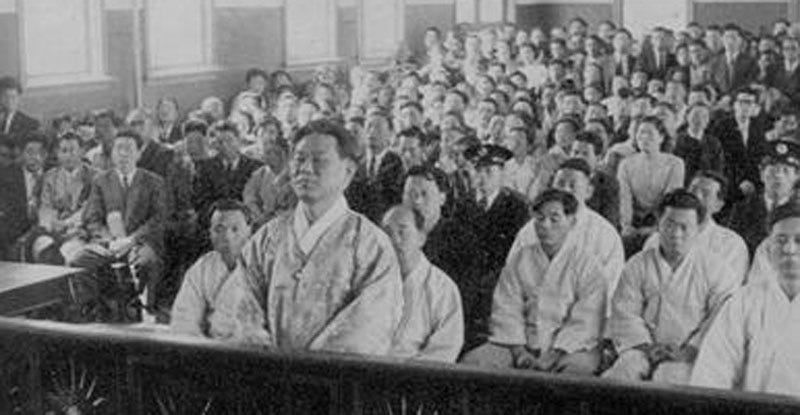
After the stalemated Korean War, President Syngman Rhee quietly dropped the idea of conquering North Korea, but kept the tough political rhetoric going. His paranoia and authoritarianism got worse as the frequency of genuine North Korean infiltration attempts increased.
During the 1956 Presidential Election, the dovish politician Cho Bong-am eloquently advocated for South Korea to seek ways of peaceful reunification with North Korea while Syngman Rhee campaigned with the militarist slogan “March North and Unify Korea” to give the impression that he was still minded to militarily subjugate North Korea and reunify the Korean Peninsular. Of course, how he was going to achieve the forceful reunification without the support of the US troops was not discussed in any detail.
President Rhee comfortably won 70% of the total votes cast in the election. Nevertheless, he was horrified that 30% of the electorate voted for his dovish political opponent. He falsely accused Cho Bong-am of being a North Korean spy and had him executed in 1959. Without Cho at the helm, the dovish pro-unification Progressive Party rapidly fell apart.
The execution of Cho Bong-am was the start of a long campaign to suppress South Korean political figures upholding the dovish tradition. Kim Young-sam was part of this particular political tradition in spite of the fact that his own mother was murdered by North Korean infiltrators in 1960. For his pro-unification beliefs and pro-democracy advocacy, he was persecuted through most of the Dictatorship Era (1961-1988).
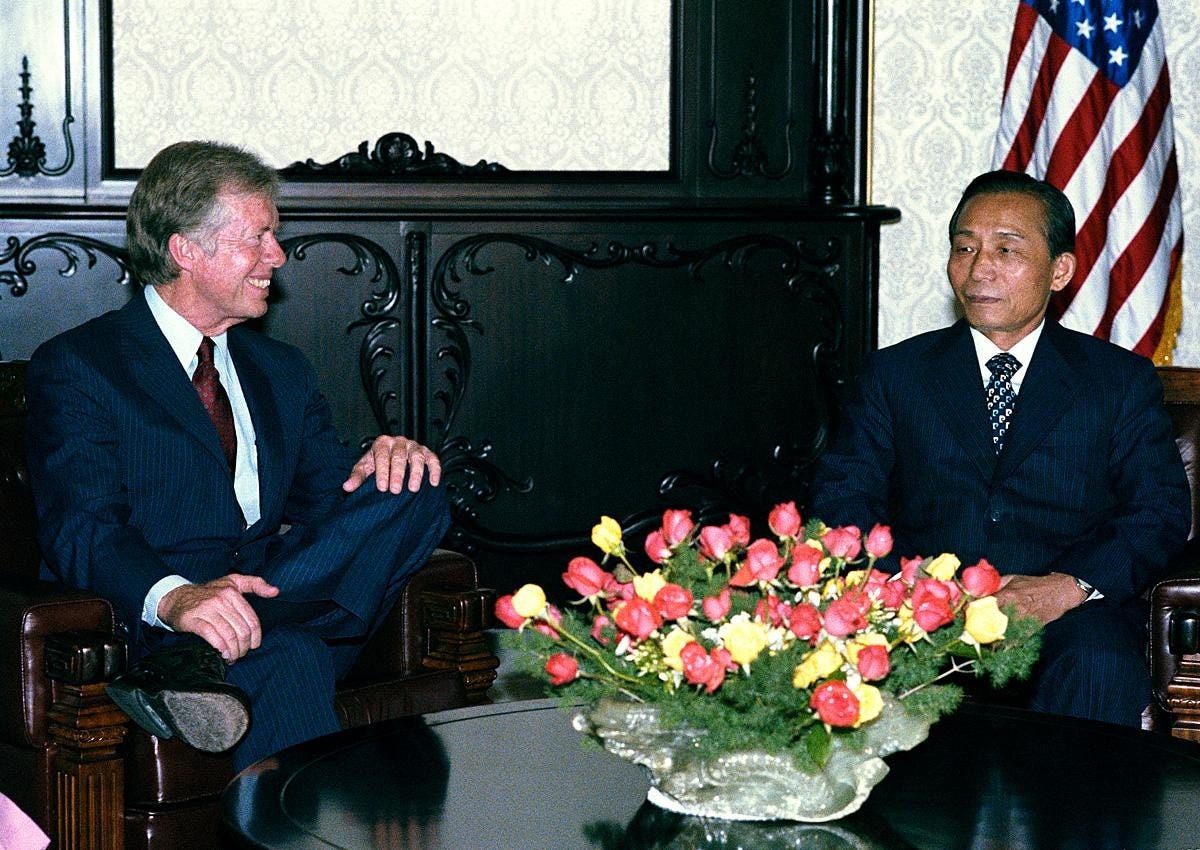
Kim Dae-jung was also a part of this pro-unification tradition and suffered greatly for it. He was briefly arrested in 1961 by the fledgling military regime of Park Chung Hee. A botched assassination attempt in 1971 forced Kim Dae-jung to flee to Japan. Two years later, South Korean intelligence agents kidnapped him from a hotel in Tokyo. They bound and gagged him, and took him out on a boat to the Sea of Japan. But before they could throw him overboard, with the heavy weight attached to his feet, Japanese Coast Guard vessels appeared and fired warning shots. A naval patrol plane belonging to the Japanese Maritime Self-Defense Force also appeared in the skies overhead.
A devout Roman Catholic, Kim Dae-jung believed it was through the miraculous work of Jesus Christ that he survived the ordeal. However, it must be said that US Ambassador Philip Charles Habib—the Lebanese American top diplomat in Seoul—had personally intervened to stop Kim from being murdered.
Subsequently, Kim Dae-jung was brought back to South Korea and put under house arrest in Seoul until his release in 1979 following the death of Park Chung Hee. He was arrested again and sentenced to death in 1980 for opposing the military regime of Chun Doo-hwan. Through the intercession of Pope John Paul II and American government officials, Kim was freed in 1982 to travel to USA to assume a new life in exile.

Under the pretext of fighting “North Korean infiltration” and “communism”, Chun Doo-hwan used Martial Law to shutter media outlets not aligned with his regime and suppress all political activities he did not like. He also brought out soldiers to shoot South Korean civilian protesters demonstrating against his brutal regime.
The failed attempt by North Korean assassins to kill Chun on 9 October 1983 while he was on a state visit to Burma reinforced the ROK Army general’s conviction that his dictatorship was “good” for South Korea.
The explosives planted planted by the North Korean assassins at the Martyr’s Mausoleum in the Burmese capital of Rangoon killed 21 people and injured 46. Chun was unharmed as he was still enroute to the mausoleum when the bomb went off. However, several accompanying South Korean government officials and journalists, who had gone ahead of him to the mausoleum, died in the bomb blast.
In the aftermath, Burma broke diplomatic ties with North Korea. Chinese government media outlets openly criticized North Korea’s assassination attempt on Chun, and diplomatic relations between DPRK and China cooled for a while.
Meanwhile, back in South Korea, repressive measures were stepped up. However, growing internal political pressures from a popular nationwide pro-democracy movement eventually forced General Chun Doo-hwan to promise genuine democratic elections.
Nevertheless, he declared that his best friend, the retired ROK Army General Roh Tae-woo, would run as a presidential candidate in the planned democratic election. The lifting of certain repressive measures in the run-up to the election facilitated the revival of the previously suppressed pro-unification political tradition. Suddenly, it was no longer dangerous to advocate for friendly overtures to North Korea in the hope of peaceful reunification of the Korean Peninsular in the distant future.
In the December 1987 Presidential Election, political dissidents Kim Young-sam and Kim Dae-jung contested against each other and against the retired General Roh Tae-woo. The two dissidents split the opposition electoral votes between themselves, enabling General Roh Tae-woo to win the election by a plurality.
Roh Tae-woo was the first of four Roman Catholics to have served as President of the ROK, with the others being Kim Dae-jung, Roh Moo-hyun, Moon Jae-in, and Yoon Suk Yeol.
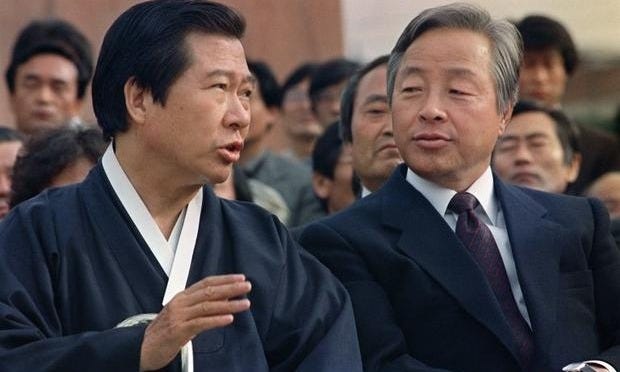
Despite the military background of President Roh Tae-woo, his democratically elected government surprisingly aligned itself with the dovish pro-unification political tradition. His administration was the first South Korean government to make serious conciliatory overtures to the North Korean ruler Kim il-Sung. As a result, relations between the two Koreas warmed for the first time since they came into existence in 1948.
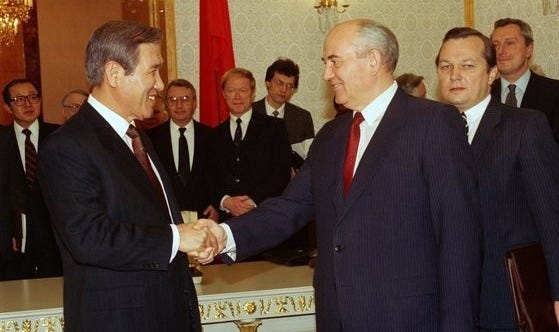
Although staunchly anti-communist, President Roh Tae-woo developed friendly ties with USSR, China and other Communist countries for pragmatic reasons. Soviet leader Mikhail Gorbachev reciprocated South Korea’s friendly gestures by establishing official diplomatic relations with Seoul to the chagrin of North Korea, a staunch ally of the USSR. President Roh Tae-woo also organized the successful 1988 Summer Olympics in Seoul.
Barred by the constitution from seeking re-election, President Roh Tae-woo did not participate in the 1992 Presidential Election. Instead, he endorsed the presidential campaign of Kim Young-sam, who was a member of the ruling party. This endorsement occurred despite the fact that both men had been adversaries during the Dictatorship Era.
The union of the historic adversaries was purely pragmatic. Back in 1990, Kim had agreed to fuse his and Roh’s pro-unification political parties. The resulting large post-merger ruling party helped Roh to build a parliamentary majority and contributed immensely to Kim’s electoral victory at the presidential election two years later.
As the national leader of South Korea, President Kim Young-sam continued the pro-unification agenda of his predecessor.
Between friendly overtures to Comrade Kim il-Sung and dissuading Bill Clinton from launching airstrikes on North Korea’s nuclear research centre, President Kim Young-sam still found time to plan his revenge on Roh Tae-woo and Chun Doo-hwan for persecuting him and others during the Dictatorship Era.
On 3 December 1995, President Kim Young-sam had both retired ROK Army generals and 16 others arrested and arraigned in court for treason and insurrection due to their involvement in military coups. The generals and co-defendants were also charged with the killing of protesters at mass demonstrations and large scale corruption that occurred during military rule.
Chun Doo-hwan and Roh Tae-woo were accused of stealing 400 billion South Korean Won (almost 370 million US dollars) between them during their time at the helm of the national government.
::::::::::::::::: Pictures below can be enlarged by clicking on them ::::::::::::::::::::::::::

The public trial of the generals and other co-defendants began in March 1996. Months later, the courts returned guilty verdicts on both former senior army officers and other defendants.
General Chun Doo-hwan was sentenced to death by hanging for his part in the massacre of hundreds of student protesters during the Gwangju Uprising. He was also convicted for staging the December 1979 coup that rendered parliament powerless and the May 1980 coup that illegally used ROK Army troops to force the abolition of the legislative body. Chun’s death sentence was later reduced to life imprisonment.
His best friend, General Roh Tae-woo— ironically, the first democratically elected President— was sentenced to 17 years imprisonment for engaging in the 1979 military coup and his role in the brutal suppression of the Gwangju Uprising. They were both required to pay back the money they pilfered from government coffers while in political office.
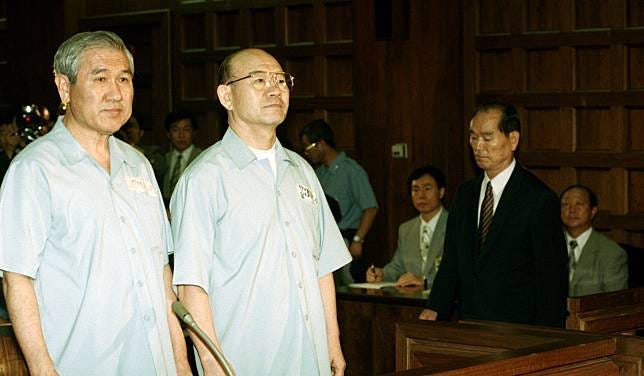
Although the arrest and jailing of Chun Doo-hwan and Roh Tae-woo was popular among many South Koreans, there were also a significant number of people who called the court trials politically motivated.
Ultimately, the two convicted army generals did not spend too much time in jail as they were pardoned by the outgoing President Kim Young-sam on the recommendation of the incoming President Kim Dae-jung, who had won the December 1997 Presidential Election. When Kim Dae-jung and his party took over the presidency in February 1998, it marked the first peaceful transfer of political power in South Korean history from a ruling party to an opposition party.
President Kim Dae-jung went much further than his predecessor on the pro-unification agenda. He instituted the “Sunshine Policy” and became the first South Korean national leader to organize an actual summit with the North Korean state and visit Pyongyang. For this effort, Kim Dae-jung won the Nobel Peace Prize in year 2000.
Nevertheless, Kim’s Sunshine Policy faced opposition from hard-right politicians with the tacit support of ROK military top brass, who had to deal with intermittent clashes between the armed forces of the two Koreas.
For the ROK military high command, the “flaws” of Kim Dae-jung’s Sunshine Policy came into stark relief with the death of six ROK Navy sailors and the injury of another eighteen during a naval skirmish between North Korean and South Korean patrol boats in the Yellow Sea on 29 June 2002.
Rightwing civilian politicians criticized the policy of sending humanitarian food aid to North Korea (DPRK) without extracting any concessions from Comrade Kim Jong-il, who had succeeded his late father, Kim il-Sung, in 1994.
After Kim Dae-jung stepped down from office in 2002, his newly elected successor, President Roh Moo-hyun carried on with the pro-unification Sunshine Policy. Despite recurrent skirmishes between the armed forces of the two Koreas, Roh Moo-hyun continued sending food aid to North Korea.
During the tenure of President Roh Moo-hyun, the hardline anti-North Korean political faction became ascendant due to public disillusion with the failures of the conciliatory Sunshine Policy.
The December 2007 Presidential Election was marked by a political pendulum swing. The anti-North Korean political faction regained the presidency with the landslide election victory of Lee Myung-bak over the dovish pro-unification candidate, Chung Dong-young.
Prior to running for presidential office, Chung Dong-young had served as Minister For Unification in the outgoing Roh Moo-hyun administration. His fervent pro-unification campaign earned him just 26.2% of the total votes cast in the 2007 Presidential Election.

As expected, the newly elected President Lee Myung-bak resumed the old political tradition of treating North Korea harshly to the delight of the ROK top military brass and the huge relief of the Americans who were uncomfortable by the concessions being made by South Korean leaders following the dovish pro-unification tradition.
While maintaining strong ties with the Americans, President Lee Myung-bak developed relations with Russia and deepened relations with China. However, relations between ROK and DPRK worsened during his time in office. In 2010, he ended the Sunshine policy of his dovish predecessors. The DPRK called him a “traitor” and issued to threats to “wipe out the Lee clan”.
Comrade Kim Jong-il died on 17 December 2011 and was succeeded by his youthful son, Kim Jong-un. The new DPRK ruler wasted no time at being tough with the South Korean government. On 6 March 2012, Korean Central Television—the official DPRK media outlet—showed North Korean soldiers firing guns at a target that had the image of President Lee.
At the end of his tenure, Lee Myung-bak was succeeded by female President Park Geun-hye, the daughter of the assassinated General Park Chung Hee. She had won the 2012 December Presidential Election with 51.6% of the total votes cast. Just like her immediate predecessor (and her late father), she upheld the hardline anti-North Korean political tradition.
DPRK reacted by ending the non-aggression pact between the two Koreas, testing nuclear weapons, and withdrawing North Korean workers from the South Korean-operated Kaesong Industrial Zone, which is situated on North Korean territory. In response, President Park Geun-hye recalled South Korean workers and shut down the industrial zone.
Park Geun-hye made history as the first South Korean President to travel to the Islamic Republic of Iran. Accompanied by a delegation of 236 business leaders, she embarked on a three-day state visit to Tehran on 1 May 2016.
Like many of her predecessors, Park Geun-hye was caught up in the usual corruption scandals and was impeached in March 2017. After her impeachment, she was arrested, tried in court and sentenced to 25 years in prison. This was later reduced to 20 years imprisonment by an appellate court. One of the government lawyers that investigated corruption allegations levelled against her was a certain Yoon Suk Yeol, who obviously took mental note of the humiliating five rounds of police interrogation that the deposed Park Geun-hye had endured while in jail.
The corruption scandal of Park Geun-hye, and divisions among politicians of the hard-right political tradition, caused the political pendulum to swing leftwards during the May 2017 Presidential Election. The dovish pro-unification political faction regained the presidency with the electoral victory of Moon Jae-in.
While firmly in the pro-American camp, President Moon Jae-in resumed overtures to North Korea, which had been abandoned a decade earlier. President Moon visited the DPRK ruler Comrade Kim Jong-un multiple times.
The South Korean President visited European countries in an unsuccessful attempt to lobby them to seek better relations with North Korea. He also sent petroleum products to North Korea, despite UN sanctions forbidding it. The Americans were not happy with Moon’s sanctions-bursting project, but relations remained cordial.
However, the transition from the Obama administration to the Trump Administration in 2017 did reduce American antipathy towards North Korea.
To the elation of President Moon Jae-in, the maverick US President Trump broke traditional American hostility to North Korea by meeting Kim Jong-un in June 2018, February 2019 and June 2019.
During the June 2019 meeting, President Trump made history by crossing the Korean Demilitarized Zone into actual DPRK territory, becoming the first American President to set foot on North Korean soil.

Despite these symbolic conciliatory gestures involving Comrade Kim, Trump and Moon, relations between the two Korean states broke down. In January 2020, Moon reiterated his policy of reconciliation with the DPRK. Relations did not improve. Five months later, the North Koreans used explosives to blow up the inter-Korean joint liaison office.
In the 2022 Presidential Election, the pendulum swung again. The anti-North Korean political faction regained power with the newly elected hardline President Yoon Suk Yeol who was determined not to do business with Comrade Kim Jong-un, and not be humiliated like the deposed President Park Geun-hye.
Prior to his ascendancy to the presidency, Yoon had publicly praised the hardline military dictatorship of General Chun Doo-hwan in a speech made during the meeting of his hard-right People Power Party on 21 October 2021.
The speech itself was surprising because as a young university student, Yoon had publicly opposed Chun Doo-hwan’s military regime in 1980 and subsequently went into hiding to avoid arrest. Perhaps, the older Yoon had grown to appreciate and admire the authoritarian ways of the military strongman ruler that he once hated.

In any case, as President of South Korea, Yoon aligned himself more closely with US foreign policies than his predecessors. He took the side of Ukraine on the Russo-Ukraine War and pledged to supply weapons to aid the war effort of the Zelensky government. He visited United States and serenaded Joe Biden with his rendition of the song “American Pie”. A seemingly impressed Biden gave the singing South Korean leader a signed acoustic guitar from musician Don Mclean who scored a hit with that song in 1971 .
Soon enough, the usual corruption scandal reared its ugly head again and caught President Yoon who had been frustrated by his inability to implement his political agenda because of obstructions put in his path by a national parliament dominated by the legislators from the opposition Democratic Party, which adheres to the dovish pro-unification political tradition.
I don’t agree with alt-media pundits who see an external hand in Yoon’s coup gambit. Most likely, Yoon merely informed the Americans in advance of the impending coup, but I doubt the Biden Administration instigated or directed it.
It is my considered opinion that Yoon’s personal authoritarian streak and his determination to not be impeached and investigated for corruption resulted in his attempted civilian coup d'état.
Another trigger for the coup attempt is the consistent refusal of the opposition party-dominated parliament to give Yoon a free hand to implement some of his government programmes. Opposition Democratic Party legislators used their parliamentary majority to radically slash the government budget without first seeking the consent of the ruling People Power Party.
It is highly unusual in the political culture of South Korea for an opposition party-dominated parliament to slash or trim a proposed government budget without first reaching some sort of compromise agreement with the ruling party. Yoon probably concluded that the opposition party was trying to destroy his government by denying it the funds necessary for implementing programmes that would improve his already flagging public approval rating.
Indeed, during his television address, Yoon himself cited the obstructionism of the opposition political party in parliament as one of the reasons for declaring his draconian Martial Law. According to him, the dovish pro-unification political opposition was sabotaging his hardline rightwing government to “help North Korea”.
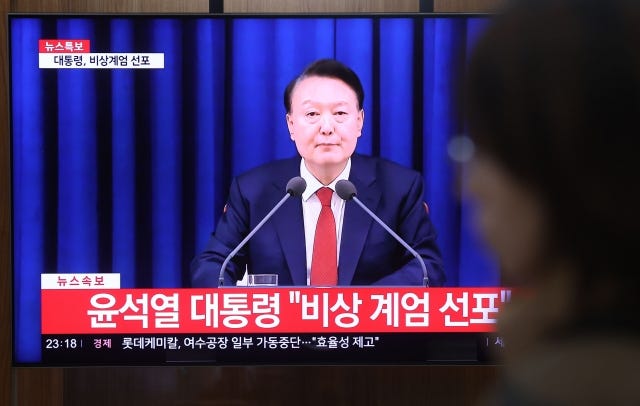
Yoon’s screeching about “pro-North Korean sympathies of the political opposition” on television was also an attempt to incite the entire ROK military top brass and politicians on the hard-right to back his coup even though he had not consulted most of them prior to the attempted putsch.
Being a civilian, Yoon is not experienced in the art of executing a proper coup d'état. For a civilian-led putsch to succeed, one must have the rock-solid support of the entire or bulk of the military top brass. Instead, he relied on a handful of hard-right political figures from the ruling People Power Party and a few senior military officers. The vast majority of key conservative figures in the country were left in the dark.
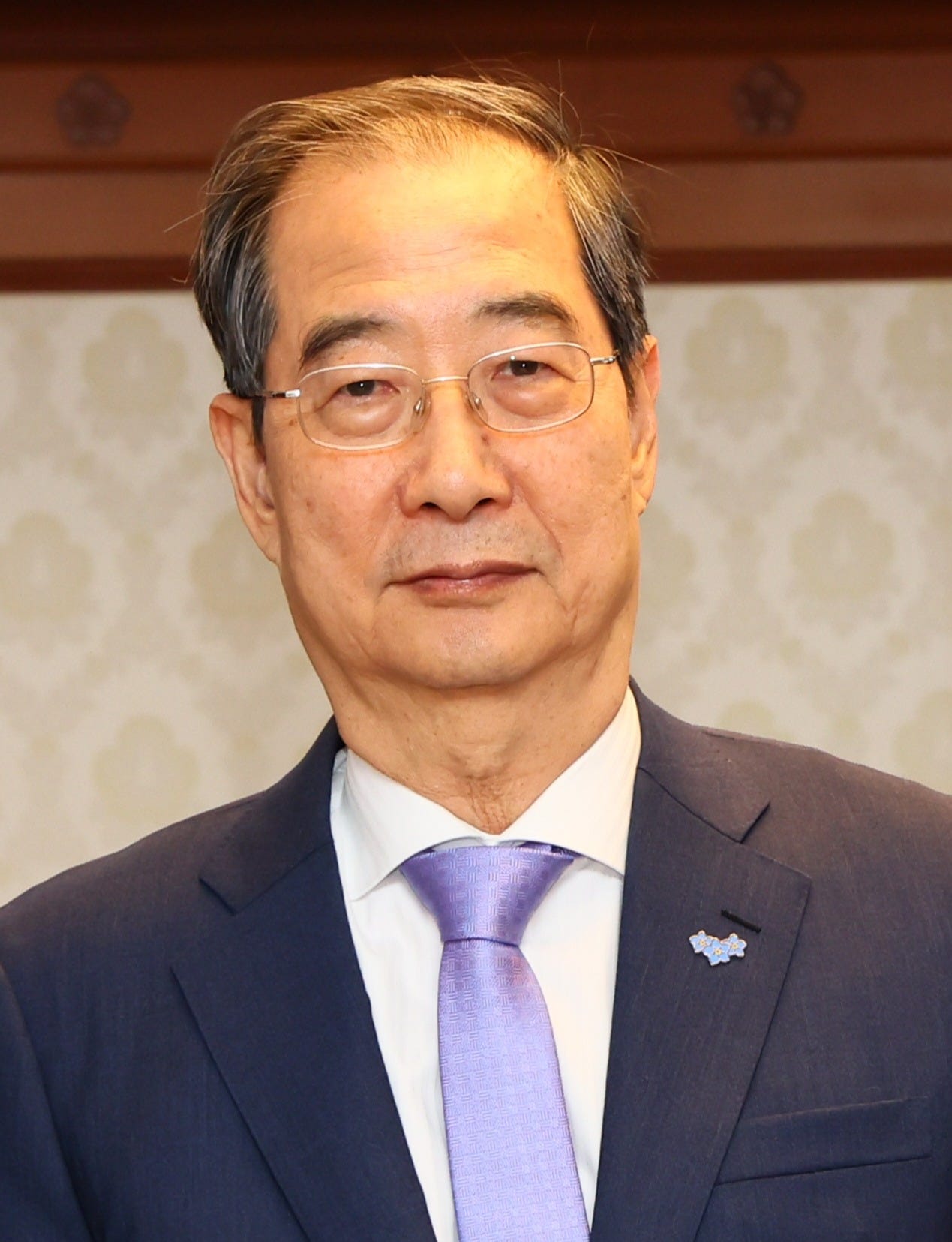
Yoon’s expectations for the success of his civilian coup hinged on the remaining senior military officers and hard-right politicians setting aside their concerns about not being consulted beforehand and backing him once he began to engage in Cold War era propaganda about the imminence of North Korean infiltration and subversion of South Korea.
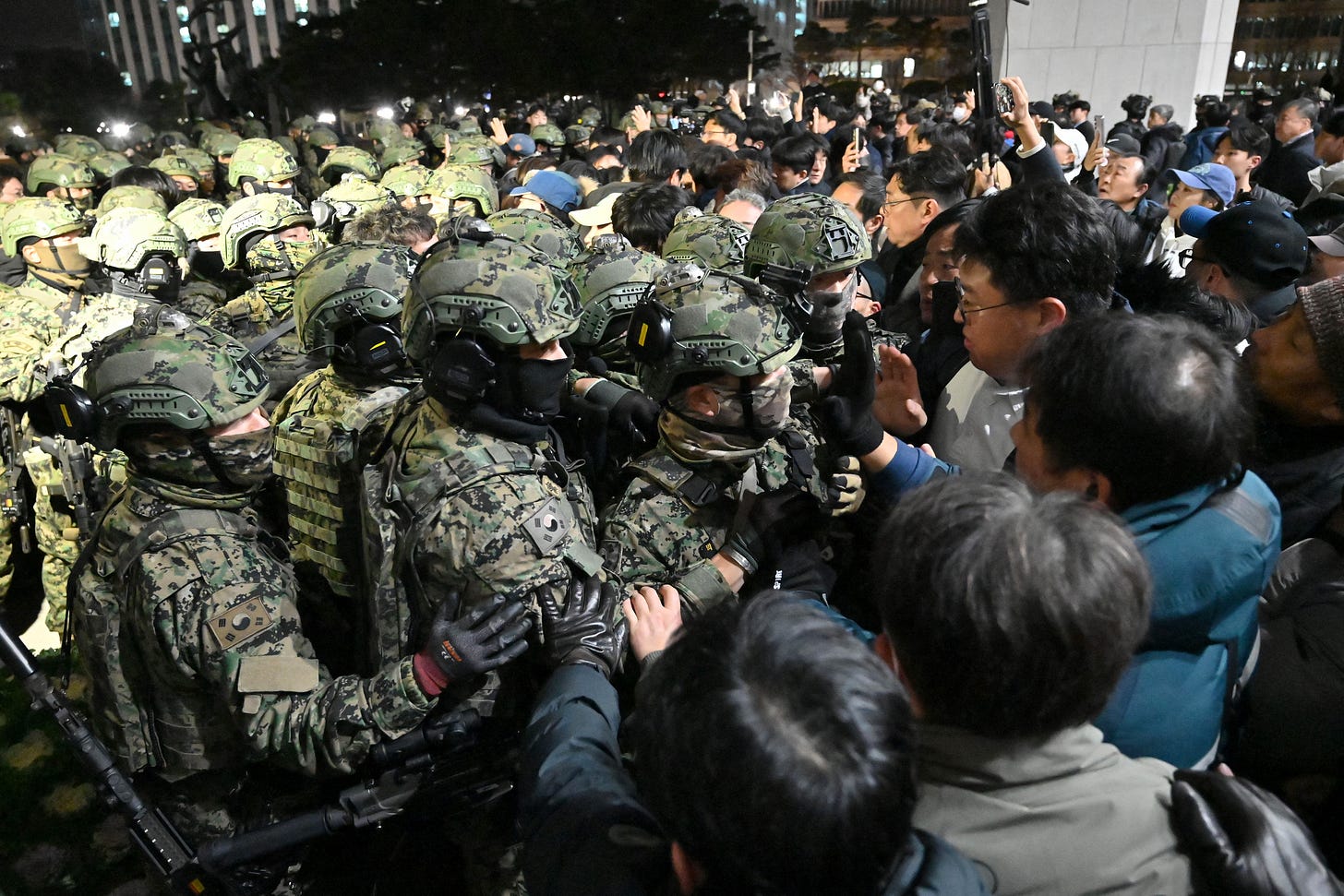
A lot has been made about Yoon’s lame coup d'état collapsing because opposition Democratic Party legislators were able to rush into parliament and nullify the Martial Law. But South Korean history tells us that parliamentarians have always failed to stop serious coup d'états.
General Park Chung Hee successfully forced the dissolution of parliament on 16 May 1961. General Chun Doo-hwan used ROK Army troops to abolish the parliament and suppress thousands of student protesters who came out against his 1980 military coup.
Yoon’s civilian coup did not fail merely because parliament nullified his Martial Law. It failed because many military officers and politicians that adhere to Yoon’s own hardline anti-North Korean political tradition did not go along with the coup gambit. They were not consulted beforehand and they did not accept Yoon’s assertions about the imminence of the “North Korean Menace”. They simply saw a man (Yoon) desperately trying to avoid the humiliation of being impeached and subject to a corruption investigation just like the deposed female President Park Geun-hye.
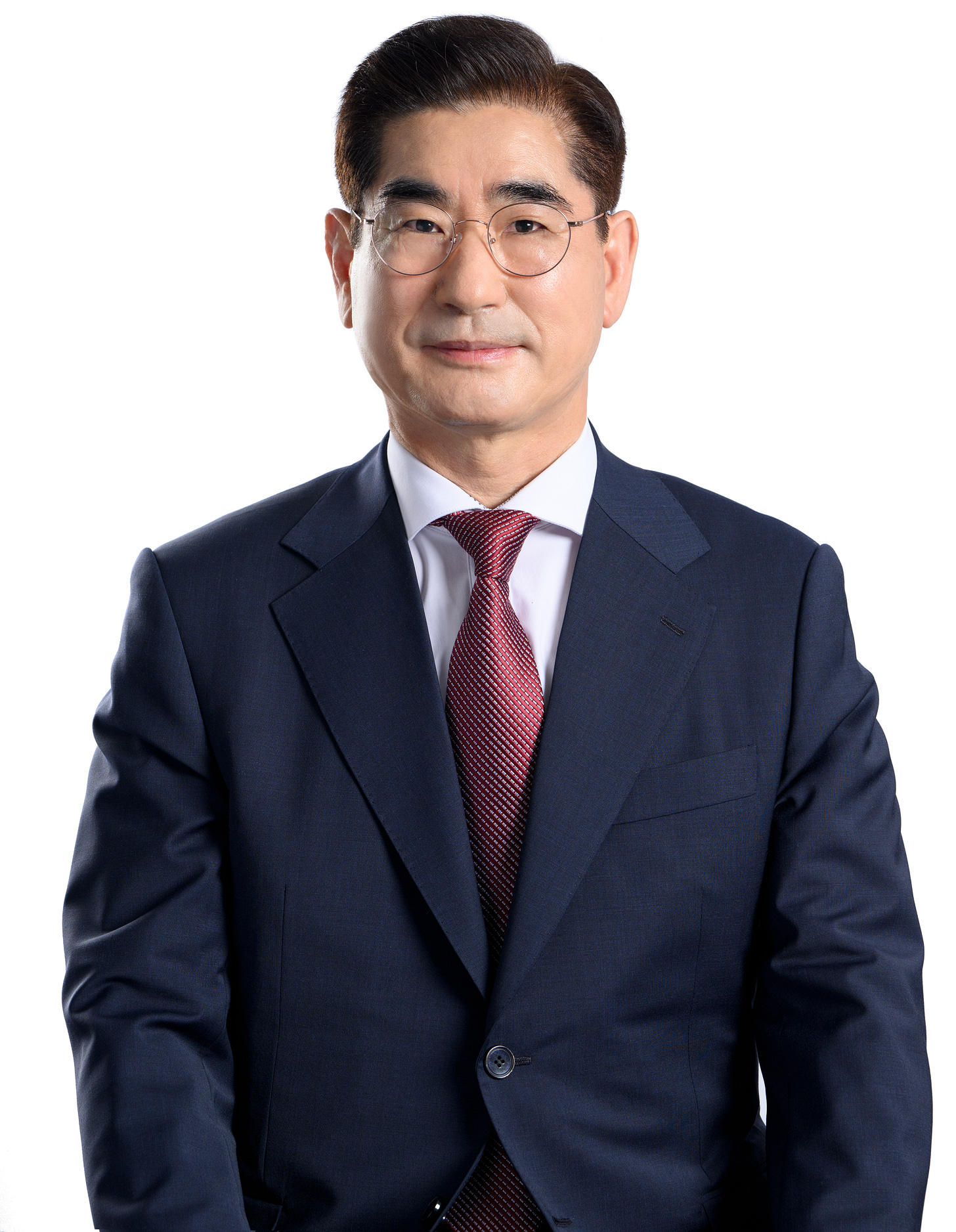
During the Cold War, claims of North Korean infiltration was a “brilliant excuse” to carry out a coup d'état even if the vast majority of South Koreans were opposed to it. What parliamentarians thought about that “brilliant excuse” did not matter because what counted was whether the heavily armed ROK military top brass accepted the excuse or not. Yoon is unluckily on the wrong timeline.

Yoon’s civilian constitutional coup would have succeeded— regardless of parliamentary action— if he were in the year 1970 when actual infiltrating North Korean agents were exploding bombs periodically in Seoul and gunning down civilian politicians (both dovish leftwing and hard-rightwing figures) and assassinating ROK Army generals whenever possible.

In the 1970 timeline, politicians and military figures on the anti-North Korean rightwing side would have accepted that Yoon’s coup was justified and that resisting parliamentarians and civilian protesters should be bulldozed aside to save ROK from DPRK infiltration.
Unfortunately in the year 2024, it is difficult to use “North Korean Menace” as an excuse to carry out a pre-emptive coup against the process of impeachment and a corruption investigation.
At the time of posting this article, attempts by parliament to impeach President Yoon has failed as the previous bipartisan condemnation of the attempted coup 'd'état has unravelled.
Parliamentarians from the opposition Democratic Party were unable to remove Yoon because his own People Party Power (PPP), while critical of the coup attempt, has refused to go along with the impeachment process.
I am certain that PPP legislators in parliament would like to see the back of President Yoon who has embarrassed the ruling party. But they would like a dignified exit for Yoon through resignation rather than through the humiliating impeachment process.
**************
NEWS UPDATE : Just three days after this article was published, Yoon was successfully impeached by parliament. His refusal to go through the dignified route of resignation had finally convinced some legislators from the ruling People Power Party to join the political opposition in parliament in voting for impeachment.
Dear reader, if you like my work and feel like making a small donation, then kindly make for my Digital Tip Jar at Buy Me A Coffee. You can also click the yellow image above.






This podcast from 2016 is still QUITE relevant.
Go to about 41:00 minutes and listen for at least 5 or 6 minutes, tell me how crazy the NK government behaviors since the armistice have been after?
Radio War Nerd EP #20—Korean War Recovered History with Tim Shorrock
https://www.patreon.com/posts/radio-war-nerd-4395383
BTW, where did my earlier comment on this post go?